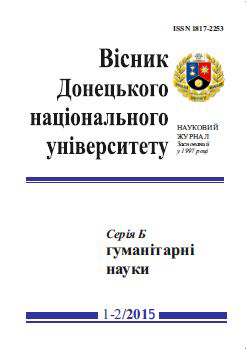Openness of public space and comfort of private.
Keywords:
private space, public space, individual, collective, borders оf privateAbstract
Article gives an overview of basic concepts of private and public space. The theoretical, methodological and practical problems of modern political philosophy are analyzed in their pepers. Classification of private and public by the american sociologist J. Weintraub is presented. He suggests to examine public as open, visible and accessible to other unlike the sight hidden or deleted from the eyeshot. Other understanding of public: as collective and that influences on the decisions of collective unlike individual (private). J. Weintraub distinguishes four scientific approach near a concept "public". In a liberallyeconomic model the state is undertaken by the role of public power. There is а delegation of economic interests of private persons in the state sphere of politics and management. А liberally-democratic model examines a public sphere in terms of civil and political association. Sociocultural model binds publicity to open communication, meeting of people in public space. It investigates cultural practices and rules, that put right the structure of public life. The gender (feminism) analysis а problem as the demonstration of differences between family and market economy. Within the scopes of liberalism opposition "private/public" was set, certain and envisaged. Feminism projects conducted her deconstruction. Differences in private and public world formation are analyzed. In particular, Н. Arendt carried out a reconstruction of history of forming and functioning of public sphere. She examines the origin of the phenomenon of publicity in ancient Greece and equates "public" and "political". The conditionality of Greek political life is underlined a language. Home space of traditional society was base on necessity. In opposition space of policy is examined him as free. Politics and area the public is shown as open-space, where everybody can differ from other, distinguished. In an order to surpass other, it is needed to be in space that has other. The relations of the home world do not perceive Other as an even participant in making of decisions. Absence does Other impossible clear definiteness open in space private.
Determination of border private/public helps to understand that is considered political and notpolitical in certain society. Publicity of communication depends on opinion of participants of itself and each other : whether they determine itself and each other as members of society in a social situation. Otherwise a man can to inherit logic of the personal interests and private life in public space. This problem becomes very actual in the conditions of the torn Ukrainian territories. A return to Ukrainian public space must be realized. Аuthentication of Ukraine as stranger other does not have historical grounds, and artificially formed on this time under act of the closed informative field. For destruction of isolation it is necessary to provide access of all territories to informative space of Ukraine, to put right the system communicative and another connections. A public sphere is called to save and provide freedom of private life.
References
Weintraub J. Varieties and Vicissitudes of Public Space // Metropolis: Center and Symbol of Times, Philip Kasinitz, Ed., 1995. – P. 280-319.
Диденко М. Концептуализация публичности: основные подходы / Cоціальні виміри суспільства. Вип. 11. – К.: Інститут соціології НАН України, 2008. – С. 52-62.
Иванова Е. Публичное: приватизация приватного / Женщины в политике: новые подходы к политическому. – Вып. 3 (2013). Электронный ресурс. – Режим доступу: http://www.fempol.com/sites/default/files/archives.
Арендт Х. Vita activа, или О деятельной жизни: Пер. с нем. и англ. В. В. Бибихина; под ред. Д. М. Носова / Х. Арендт. – СПб: Алетейя, 2000. – 437 с.
Ідея культури: виклики сучасної цивілізації / Є. К. Бистрицький, С. В. Пролеєв, Р. В. Кобець, Р. В. Зимовець. – К.: «Альтерпрес», 2003. – 192 с.
Волковинська В. О. Публічне і приватне: необхідність кордонів чи криза інтерпретації / Молодий вчений. – 2015. – № 2 (17). – С. 46-50.
Arendt H. The Human Condition / Hannah Arendt. – University of Chicago Press, 1998. – 370 p.

